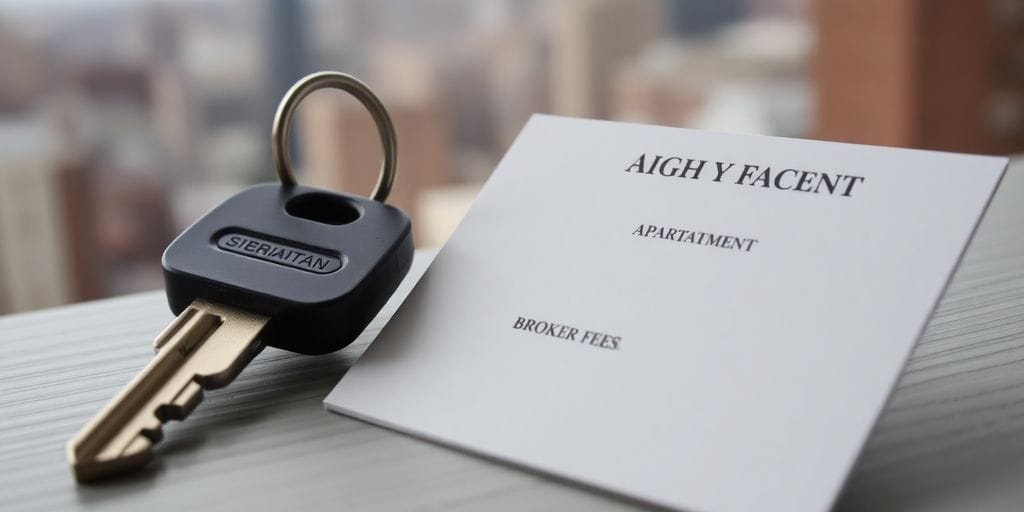If you’re on the hunt for an apartment in New York City, you’ve probably heard of broker fees. These fees can be a real headache for renters, often adding a significant cost to the already high expenses of moving. Understanding how these fees work, what they cover, and how to potentially avoid them can make your rental experience a lot smoother. This guide aims to break down everything you need to know about New York City broker fees, so you can make informed decisions while searching for your new home.
Key Takeaways
- Broker fees are typically paid to real estate brokers for their assistance in finding a rental property.
- In NYC, broker fees can be as high as 15% of the annual rent, but they are negotiable.
- The recent FARE Act aims to shift the responsibility of broker fees from renters to landlords, making fees clearer.
- Knowing your rights as a renter can help you navigate broker fees and avoid unfair charges.
- Finding no-fee apartments or negotiating with brokers are effective strategies to save money.
Broker Fee Basics
What Is a Broker Fee?
Okay, so you’re diving into the NYC rental market, and you keep hearing about "broker fees." What’s the deal? A broker fee is basically what you pay a real estate broker for helping you find an apartment. Think of them as a matchmaker between you and your next place. They show you apartments, handle paperwork, and try to get you the best lease terms. For all this, they get a fee, usually a percentage of the annual rent.
Laws About Broker Fees
Broker fees aren’t just some random charge; there are laws around them, especially in a place like NYC. These laws dictate when a broker can charge a fee, how much they can charge, and what services they need to provide to earn that fee. It’s important to know your rights as a renter, so you don’t get taken advantage of. Starting June 14, 2025, a new law will require property owners to pay broker fees when hiring brokers, shifting the financial responsibility from tenants to owners. This change is intended to alleviate costs for renters.
Broker Fee Basics in NYC
NYC’s rental market is unique, and so are its broker fees. Here’s the lowdown:
- Broker fees are negotiable. Don’t be afraid to try and lower the fee, or even ask if they can waive it. Showing that you’re a reliable tenant with a good credit score and stable income can help your negotiation.
- The standard realtor commission for a home sale typically hovers around 6%, shared between the listing agent and the buyer’s agent. On a $250,000 home, that commission can amount to a hefty $15,000.
- Some brokers don’t charge the renter a fee! These "no-fee brokers" get paid by the landlord instead. Look for listings that say "no-fee" or "tenant pays zero fee."
It’s good to remember that broker fees are a part of the cost of renting in NYC, but they don’t have to be a burden. Knowing what they are, how they work, and what your rights are can make a big difference in your apartment search.
Understanding Broker Fees

What Do Broker Fees Cover?
Broker fees in NYC aren’t just random charges; they cover the broker’s work in finding you a place. Think of it this way: they’re your personal apartment hunter. They spend time searching listings, scheduling viewings, driving you around (maybe), and helping with the application process. The fee compensates them for their time, expertise, and access to listings you might not find on your own.
- Finding suitable apartments that match your criteria.
- Arranging and attending apartment viewings.
- Assisting with the application process, including paperwork.
- Negotiating lease terms with the landlord (sometimes).
It’s easy to feel like you’re paying a lot for something you could do yourself, but brokers often have access to exclusive listings and can streamline the often-stressful apartment search. They also know the market inside and out, which can be a huge advantage.
How Are Broker Fees Calculated?
Generally, broker fees in NYC are calculated as a percentage of the annual rent. It’s common to see fees ranging from one month’s rent up to 15% of the annual rent. The exact percentage can depend on a few things, like the apartment’s location, the demand for rentals, and the brokerage’s policies. It’s important to ask upfront how the fee is calculated to avoid surprises. You can always try to negotiate a lower fee.
Here’s a simple example:
| Rent per Month | Annual Rent | Broker Fee (15%) |
|---|---|---|
| $2,500 | $30,000 | $4,500 |
| $3,000 | $36,000 | $5,400 |
| $3,500 | $42,000 | $6,300 |
Common Misconceptions About Broker Fees
There are a lot of misunderstandings about broker fees. One big one is that they’re set in stone. They aren’t! You can often negotiate, especially if you’re a strong applicant with good credit and a stable job. Another misconception is that all apartments require a broker fee. That’s also not true. Many buildings are "no-fee," meaning you deal directly with the landlord or management company. Finally, some people think the broker fee goes straight into the broker’s pocket. In reality, the realtor commission is split between the brokerage and the agent, and the brokerage uses its share to cover costs.
- Misconception: Broker fees are non-negotiable.
- Reality: Negotiation is possible, especially with a strong application.
- Misconception: All NYC apartments require a broker fee.
- Reality: No-fee apartments are available; look for them specifically.
- Misconception: The broker keeps the entire fee.
- Reality: The fee is split with the brokerage and covers operational costs.
Are Broker Fees Legal?
Legal Framework Surrounding Broker Fees
So, are broker fees actually legal? Generally, yes, but it’s not quite that simple. In New York City, brokers can charge fees for their services, which include showing apartments, helping with paperwork, and generally making the rental process smoother. However, there are rules in place to protect renters. For example, brokers must disclose their fees upfront. The FARE Act is also something to keep in mind.
Rights of Renters Regarding Broker Fees
As a renter, you have rights when it comes to broker fees. It’s important to know them. You have the right to:
- Know about the fee upfront. No surprises!
- Negotiate the fee. Don’t be afraid to try!
- Not pay a fee if you found the apartment yourself. If the broker didn’t help you find the place, they might not be able to charge you.
It’s always a good idea to document everything. Keep records of all communications with the broker, any agreements made, and any payments you’ve made. This can be helpful if you ever need to dispute a fee.
Exceptions to Broker Fee Charges
There are situations where a broker might not be able to charge a fee. For example, if you contact the landlord directly and find an apartment without the broker’s assistance, you might not owe them anything. Also, if a broker is representing the landlord, they usually can’t charge you, the renter, a fee. It’s worth checking out no-fee apartments to avoid these charges altogether. Remember, knowledge is power!
How to Reduce or Avoid Broker Fees
Negotiating Broker Fees
Okay, so you’re staring down a hefty broker fee. Don’t freak out! Remember, everything is negotiable. It might seem intimidating, but it’s worth a shot. Start by doing your research. See what similar apartments in the area are going for, and if they have broker fees attached. If you find comparable places without fees, use that as leverage.
- Highlight your strengths as a tenant. Got a stellar credit score? Stable job? Landlords love that stuff.
- Be polite but firm. Explain that while you love the apartment, the fee is a sticking point.
- Be prepared to walk away. Sometimes, the broker just won’t budge, and that’s okay. There are other apartments out there.
It’s important to understand that brokers are also trying to make a living. However, that doesn’t mean you can’t advocate for yourself and try to get a better deal. Approach the negotiation with respect and a clear understanding of your own financial situation.
Finding No-Fee Apartments
This is the holy grail, right? Avoiding the fee altogether. The good news is, they do exist! You just have to be diligent in your search. Websites like StreetEasy and Zumper often let you filter by "no-fee" apartments. Also, keep an eye out for buildings that are managed directly by the landlord or management company. These often skip the broker entirely. You can also try looking in the slower rental seasons, like winter, when landlords might be more willing to waive fees to attract tenants. Don’t forget to check out smaller, local management companies. They might not have the same online presence, but they could have some hidden gems. Consider expanding your search area slightly. Sometimes, moving a few blocks can open up a whole new world of no-fee options. You can also ask friends or colleagues if they know of any buildings that don’t charge fees. Word-of-mouth can be surprisingly effective. Remember to check out broker fee basics to understand your rights.
Tips for Working with Brokers
Even if you can’t avoid a broker entirely, there are ways to make the process smoother and potentially save some money. First, be upfront about your budget and what you’re looking for. A good broker will respect that and won’t waste your time showing you places you can’t afford. Second, be responsive and communicative. Brokers are more likely to work with tenants who are easy to reach and quick to provide information. Third, don’t be afraid to ask questions. Understand what the broker’s fee covers and what services they provide. If you’re not happy with the service, don’t be afraid to speak up. Finally, remember that you’re in control. You’re the one paying the fee, so make sure you’re getting what you want.
Here’s a quick checklist for working with brokers:
- Clearly define your needs and budget.
- Communicate effectively and promptly.
- Ask questions and understand the fee structure.
- Don’t hesitate to voice concerns or negotiate terms.
Financial Considerations for Renters
Understanding Security Deposits
Security deposits are a standard part of renting, but it’s good to know the rules. In New York, landlords usually ask for one month’s rent as a security deposit. This money is there to cover any damages to the apartment beyond normal wear and tear, or if you skip out on rent. When you move out, you should get the deposit back, as long as you’ve kept the place in good shape and paid everything you owe. Make sure to document the condition of the apartment when you move in and out – photos and videos are your friends here. This can help avoid disputes later on. Also, be aware of your rights regarding the security deposit return timeline, which is set by law.
Additional Costs Beyond Broker Fees
Okay, so you’ve figured out the broker fee situation, but don’t stop there! There are other costs that can sneak up on you when you’re renting in NYC. Here’s a quick rundown:
- Application Fees: Landlords often charge these to cover credit and background checks. They’re usually non-refundable, so be selective about where you apply.
- Utilities: Unless your lease says otherwise, you’ll likely be responsible for electricity, gas, and sometimes even water. Budget accordingly – these can fluctuate depending on the season.
- First and Last Month’s Rent: Some landlords want both upfront, in addition to the security deposit. This can really add to your initial costs.
- Amenity Fees: Some buildings charge extra for access to things like gyms or rooftop terraces. These can be optional, but if you want to use those perks, factor them into your budget.
Don’t forget about moving expenses! Hiring movers, buying packing supplies, and even just renting a truck can add up. It’s easy to overlook these costs when you’re focused on the big stuff, but they’re definitely worth considering.
Budgeting for Rental Expenses
Creating a budget is key to managing your rental expenses. Start by figuring out your monthly income and then listing all your expected costs. Be realistic – it’s better to overestimate than underestimate. Here’s a simple way to break it down:
- Calculate your total monthly income after taxes.
- List all fixed expenses: Rent, utilities, internet, phone, insurance, etc.
- Estimate variable expenses: Groceries, transportation, entertainment, etc.
- Set aside money for savings and emergencies.
| Expense Category | Estimated Monthly Cost |
|---|---|
| Rent | $X |
| Utilities | $Y |
| Groceries | $Z |
| Transportation | $A |
| Entertainment | $B |
| Savings/Emergency Fund | $C |
| Total Expenses | $Total |
If your total expenses are more than your income, you’ll need to make some adjustments. Consider finding a cheaper apartment, cutting back on non-essential spending, or finding ways to increase your income. Also, remember to factor in the cost of renter’s insurance to protect your belongings.
The Impact of the FARE Act

Overview of the FARE Act
So, the FARE Act. What’s the deal? Basically, it’s supposed to make things fairer for renters in NYC when it comes to broker fees. The idea is that if you, as a renter, didn’t hire the broker, you shouldn’t be stuck paying their fee. Sounds simple enough, right? In theory, it shifts the responsibility for those fees to the landlords. The FARE Act also wants to make sure everyone is upfront about all the costs involved right from the start. No more hidden fees sneaking up on you!
Changes in Broker Fee Responsibilities
Okay, so how does this actually change things? Well, before the FARE Act, it was kind of a mixed bag. Some apartments were advertised as "no-fee," meaning the landlord covered the broker’s commission. But a lot of times, renters were still expected to pay that fee, which could be a huge chunk of change. The FARE Act aims to standardize things, making it clear that landlords are generally responsible for paying the broker if the renter didn’t hire them. This shift in responsibility is a big deal for renters who are already struggling with high rents and other expenses.
Implications for Renters and Landlords
Here’s where it gets a little tricky. While the FARE Act sounds great for renters, there have been some unintended consequences. Some landlords, instead of just paying the broker fees, have started to increase rents or find other ways to make up the difference. It’s like they’re playing a game of financial whack-a-mole. So, even with the FARE Act in place, renters still need to be careful and do their homework. Landlords are adjusting, and renters need to stay informed to make smart choices.
It’s a bit of a cat-and-mouse game. The FARE Act was meant to ease the burden on renters, but landlords are finding ways to adapt. Renters need to be vigilant and understand their rights to avoid getting caught in the crossfire.
Here’s a quick rundown of what to keep in mind:
- Always ask about all fees upfront.
- Compare rents in different buildings.
- Know your rights as a renter.
Real-Life Experiences with Broker Fees
Success Stories from Renters
It’s easy to feel overwhelmed by broker fees in NYC, but many renters have successfully navigated the system to their advantage. Hearing about these wins can give you the confidence to try negotiating yourself. For example, Sarah managed to negotiate her broker fee down by 20% simply by highlighting her excellent credit score and stable employment history. Another renter, Mark, found a no-fee broker after doing some research online, saving himself thousands of dollars. These stories show that with preparation and a bit of assertiveness, it’s possible to reduce or even avoid these fees.
Lessons Learned from Broker Interactions
Dealing with brokers can be a learning experience, to say the least. One common lesson is the importance of doing your homework. Don’t just accept the first apartment you see or the first fee you’re quoted. Research comparable properties and understand the market value. Another key takeaway is to always get everything in writing. Verbal agreements mean very little, so make sure any fee arrangements or concessions are documented. Finally, don’t be afraid to walk away if you feel like you’re not being treated fairly. There are plenty of apartments and brokers out there, and it’s better to keep looking than to get stuck in a bad deal.
Strategies for Navigating Broker Fees
Here are some strategies that renters have used to successfully navigate broker fees:
- Negotiate: Always try to negotiate the fee. Many brokers are willing to lower their commission, especially if you’re a strong applicant.
- Look for no-fee apartments: These apartments are becoming more common, and they can save you a significant amount of money.
- Be prepared to walk away: If a broker is unwilling to negotiate or you feel like you’re being treated unfairly, don’t be afraid to walk away.
One thing I learned is that timing is everything. Searching during the off-season (winter months) can give you more leverage, as there’s less competition for apartments. Landlords and brokers may be more willing to negotiate to fill vacancies.
Here’s a quick look at how upfront costs can add up:
| Expense | Average Cost |
|---|---|
| Broker Fee | $3,000+ |
| First Month’s Rent | $3,000+ |
| Security Deposit | $3,000+ |
| Total | $9,000+ |
Wrapping It Up
So, there you have it. Broker fees in New York City can be a real headache, but knowing the ins and outs can make a big difference. Remember, these fees are legal, but you have rights as a renter. Always ask questions and don’t be afraid to negotiate. Whether it’s finding a no-fee apartment or working with a broker you trust, being informed is your best bet. At the end of the day, it’s about finding a place you love without breaking the bank. Good luck out there!
Frequently Asked Questions
What exactly is a broker fee?
A broker fee is a charge you pay to a real estate broker for helping you find a rental property. They assist in showing you apartments, handling paperwork, and negotiating lease terms.
Are broker fees legal in New York City?
Yes, broker fees are legal in NYC, but there are rules about how they can be charged. Brokers must be clear about their fees before you agree to anything.
How are broker fees usually calculated?
Broker fees are often based on a percentage of your annual rent. This can be around 15%, but it can vary depending on the broker and the rental market.
Can I negotiate broker fees?
Yes, you can negotiate broker fees. Be polite but firm, and ask if there’s any flexibility in the fee. It never hurts to ask!
What are some ways to avoid paying broker fees?
You can look for no-fee apartments or work directly with landlords. Some brokers also offer lower fees if you sign a longer lease.
How does the FARE Act affect broker fees?
The FARE Act aims to make broker fees clearer and usually shifts the responsibility of paying them from renters to landlords, but it’s important to know the details.










